Intrinsic functional dysregulation of CD4 T cells occurs rapidly following persistent viral infection
- PMID: 16051844
- PMCID: PMC1182641
- DOI: 10.1128/JVI.79.16.10514-10527.2005
Intrinsic functional dysregulation of CD4 T cells occurs rapidly following persistent viral infection
Abstract
Effective T-cell responses are critical to eradicate acute viral infections and prevent viral persistence. Emerging evidence indicates that robust, early CD4 T-cell responses are important in effectively sustaining CD8 T-cell activity. Herein, we illustrate that virus-specific CD4 T cells are functionally inactivated early during the transition into viral persistence and fail to produce effector cytokines (i.e., interleukin-2 and tumor necrosis factor alpha), thereby compromising an efficient and effective antiviral immune response. Mechanistically, the inactivation occurs at the cellular level and is not an active process maintained by regulatory T cells or antigen-presenting cells. Importantly, a small subpopulation of cells is able to resist inactivation and persist into the chronic phase of infection. However, the virus-specific CD4 T-cell population ultimately undergoes a second round of inactivation, and the cells that had retained functional capacity fail to respond to rechallenge in an acute time frame. Based on these results we propose a biological mechanism whereby early CD4 T-cell inactivation leads to a subsequent inability to sustain cytotoxic T-lymphocyte function, which in turn facilitates viral persistence. Moreover, these studies are likely relevant to chronic/persistent infections of humans (e.g., human immunodeficiency virus, hepatitis C virus, and hepatitis B virus) by providing evidence that a reservoir of virus-specific CD4 T cells can remain functional during chronic infection and represent a potential therapeutic target to stimulate the immune response and establish control of infection.
Figures
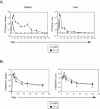
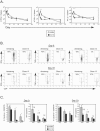
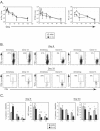
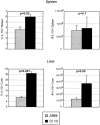

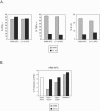
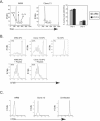
References
-
- Adler, A. J., C. T. Huang, G. S. Yochum, D. W. Marsh, and D. M. Pardoll. 2000. In vivo CD4+ T cell tolerance induction versus priming is independent of the rate and number of cell divisions. J. Immunol. 164:649-655. - PubMed
-
- Berger, D. P., D. Homann, and M. B. Oldstone. 2000. Defining parameters for successful immunocytotherapy of persistent viral infection. Virology 266:257-263. - PubMed
Publication types
MeSH terms
Substances
Grants and funding
LinkOut - more resources
Full Text Sources
Other Literature Sources
Research Materials

